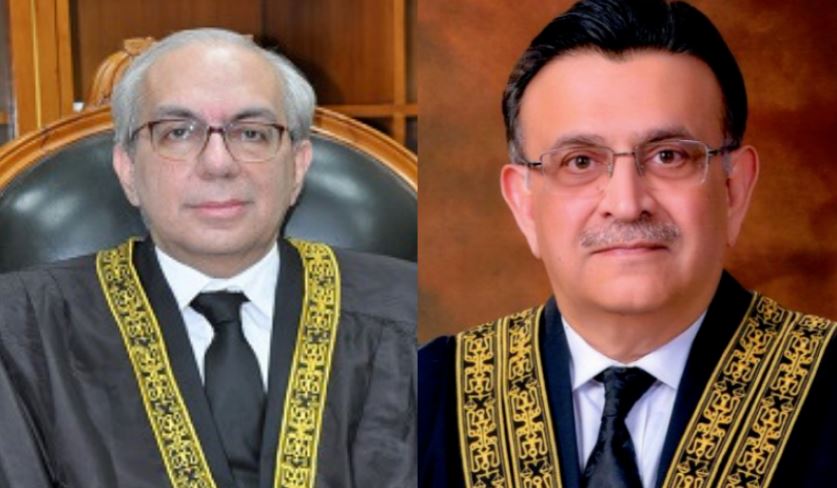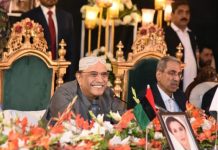ISLAMABAD, MAR 21: Supreme Court Justice Munib Akhtar observed on Monday that after joining a political party, a lawmaker’s individual vote during no-confidence proceedings was considered a “collective right”.
He said that according to Article 95(ii) of the Constitution, which deals with the procedure to bring in a no-confidence motion against the prime minister, a member’s individual vote had “no status”, adding that the court had previously made similar observations in cases related to former prime ministers Benazir Bhutto and Nawaz Sharif.
After joining a political party, a member’s vote was considered a “collective” right, he added.
According to senior lawyers — Abdul Moiz Jaferii and Barrister Salahuddin Ahmed — this observation by the learned judge, if taken to its logical conclusion, would mean that lawmakers cannot vote against party lines during no-confidence proceedings against the premier and if they do, their vote may not be counted and/or they may face disqualification. Both lawyers said they did not agree with this interpretation of the Constitution.
They, however, said it was difficult to read Justice Akhtar’s mind from a single observation and pointed out that the court had not issued a final order on the issue as yet. Jaferii said not allowing a lawmaker to vote against party line in a no-trust motion was a “restrictive” reading of the Constitution, but added that the judge’s reasoning behind the observation, which will become clear once a written order is issued, could shed more light on the matter.
Justice Akhtar made the observation during the hearing of a presidential reference filed by the government, asking the top court for its opinion on Article 63-A of the Constitution, which deals with disqualification of a lawmaker over defection. The court was also hearing a plea filed by the Supreme Court Bar Association (SCBA), seeking its intervention to prevent “anarchy” and to direct all state functionaries to act in accordance with the Constitution and the law ahead of the no-trust vote against Prime Minister Imran Khan.
A two-judge bench, comprising Chief Justice of Pakistan Umar Ata Bandial and Justice Akhtar, heard the SCBA petition and the presidential reference, for which a five-member larger bench was formed by the chief justice. The next hearing on the reference is on March 24.
Through the reference, the government has raised a number of questions, asking the apex court whether lawmakers’ votes would be counted if they voted against party lines in the no-trust motion against the premier and whether the punishment for defection was just de-seating the member with no further restriction on seeking election afresh or lifelong disqualification from contesting election.
Opposition leaders — PML-N president Shehbaz Sharif, PPP Chairman Bilawal Bhutto-Zardari and JUI-F chief Maulana Fazlur Rehman — were also present during the hearing as the court had on Saturday issued notices on the SCBA petition to the ruling PTI, PML-N, PPP, JUI-F, Balochistan National Party (Mengal) and the Awami National Party through their respective secretary generals, though they were represented by their legal counsel.
The court had sought assistance from the six political parties, including the proponents of the no-trust motion in the National Assembly, and ordered the Islamabad police chief to come up with a comprehensive report regarding Friday’s breaching of Sindh House by PTI activists.
The court also issued notices to the respondents for their assistance in ensuring a smooth, lawful and peaceful completion of the process under Article 95 of the Constitution, related to the no-confidence vote against the prime minister.
The federal government through the interior and defence secretaries, the prime minister, leader of the opposition in the National Assembly, National Assembly speaker and secretary, Islamabad chief commissioner and deputy commissioner and Inspector General of Police are respondents in the SCBA petition.
During the hearing today, Justice Bandial said the bar wanted that MNAs be allowed to vote for whoever they wanted, remarking that if the SCBA went into too much detail, Justice Akhtar’s observation would become an “obstacle”.
“The question is whether individual choice can be different from the party’s stance,” the chief justice said.
The bar’s counsel, Mansoor Usman, argued that parliamentarians should have the right to vote in their individual capacities at which Justice Akhtar asked which article allowed that.
The counsel mentioned Article 66 — related to members’ privileges — at which Justice Akhtar again asked how it gave the right to vote in individual capacity.
Article 66 protects parliamentary proceedings, the judge observed, adding, “According to Article 63, the case of a member’s vote can be brought to the court.”
The chief justice added that any member’s right to vote was “not absolute”.
‘Not convinced to interfere in NA proceedings’
During the hearing today, the SCBA counsel said National Assembly Speaker Asad Qaiser had summoned the session on March 25 — 17 days after the opposition submitted the no-confidence motion — whereas, according to Article 95, the session had to be called within 14 days.
He further said the no-confidence resolution would be moved in the NA on March 25 while it could not be adjourned indefinitely before voting on the motion.
All of this was the assembly’s “internal matter”, the chief justice observed, adding that it would be “better if the assembly’s fight was fought inside the assembly”.
“The court has to ensure that nobody’s right is affected [and] nobody is deprived from voting because of any event,” he said. “Voting is a constitutional right of the members.”
The Supreme Court had to decide in accordance with the law and the Constitution, Justice Bandial said, adding that the court had not yet been “convinced to interfere in the assembly’s proceedings”.
All the points raised in court could be taken to the NA speaker, he observed.
Chief Justice Bandial said political parties should show their power in parliament, observing that the police could not “raise a hand” on any lawmaker. However, “if MNAs break the law, police will take action,” he added.
“The court will play the role of mediator between the political parties to ensure democracy stays intact,” the CJP said.
‘No MNA will be stopped by crowds’
Meanwhile, Attorney General of Pakistan (AGP) Khalid Jawed Khan told the court that the government had no objection to the SCBA’s petition.
Justice Akhtar said perhaps Article 254 — which states that the failure to comply with requirement as to time does not render an act invalid — had been “misunderstood”.
The AGP responded that the court was not discussing parliamentary proceedings [of the no-confidence vote], otherwise he would have mentioned the reason for the delay.
He said the SCBA had appealed to all agencies to act in accordance with the law and its petition was also related to the law and order situation amid upcoming rallies in the capital.
“After talking to the prime minister, I would like to clarify something to the court,” the attorney general said. “There will be no crowd outside the assembly during the session. No [lawmaker] will be stopped by crowds.”
The AGP told the court that police and relevant agencies had been issued orders to not allow the public to enter the Red Zone during the NA session.
Sindh House attack
Islamabad Inspector General of Police (IGP) Qazi Jamilur Rehman, who also appeared during today’s hearing, informed the court that section 144 of the Code of Criminal Procedure was already in force in the capital and had been broadened to include the Red Zone.
The people protesting at the Sindh House did not come in the form of a group, he said, adding that 15 of them, including two MNAs, were arrested during Friday’s incident.
“JUI-F supporters too tried to enter the Sindh House,” he said, adding that they were stopped at the Balochistan House. The capital police chief expressed “shame” over the incident.
Chief Justice Bandial remarked that what happened at the Sindh House did “not seem to be the police’s failure”. “The main issue is related to stopping MNAs from voting.
“Something happened at D-Chowk happened recently, the effects of which can be seen”. Referring to the last hearing on March 19, he said the purpose of holding the hearing on Saturday had been to direct everyone to act in accordance with the Constitution.
The CJP said it would be seen where the investigation into the Sindh House incident led.
The SCBA, in its plea, had sought the court’s directions for all state functionaries “to act strictly in accordance with the Constitution and the law and they be restrained from acting in any manner detrimental to and unwarranted by the Constitution and the law”.
It had also demanded that officials tasked with the responsibility to maintain law and order in Islamabad must “prevent any assembly, gathering, public meetings and/or processions that could hamper the assembly proceedings or participation of members in the session”.
‘Action to be taken under Article 63-A’
AGP Khan said that action would be taken against dissident members under Article 63-A in accordance with party policy.
“There is no allegation of horse-trading against the ruling party,” he said, adding that as the attorney general, he would not level allegations against any other party as well.
“Benazir Bhutto had ordered that [parliamentarians] be forcibly brought during the no-confidence vote. Her supporters were kept in places like Changa Manga. If any member does not want to come to the session, he will not be brought forcibly.”
The attorney general further said that the party head could initiate action under Article 63-A.
Justice Akhtar inquired what would happen if an MNA goes to the assembly despite being stopped by their party.
“People voting against the party policy cannot be stopped,” the AGP replied, adding that government instructions were “not necessary” in this regard.
He assured the court that parliamentary proceedings on the no-confidence vote would be conducted in accordance with the Constitution.
The chief justice said that the matter was not just a legal issue but also a political one. Therefore, “ego should not be involved [and] the process should be completed amicably,” he said.
“If you fear clash, bring us the relevant material on March 24. If all the political parties are on one page, we will prepare a code of conduct,” the chief justice said.

















